Research
Overview:
Modern oceans are in an era of extraordinary change, reflecting increasing anthropogenic disturbance on top of longer-term natural climate variability. The McMahon lab is actively engaged in basic and applied research to examine the roles that food web architecture play in the function and resilience of marine ecosystems, and how climate change and human-environment interactions alter those relationships. Through controlled feeding experiments, our lab develops a quantitative understanding of the biochemical and physiological mechanisms that control resource acquisition and allocation. We then apply this knowledge in large-scale field studies to examine a wide range of questions from individual nutritional ecology and population connectivity to ecosystem-scale food web dynamics and the functioning of the biological pump. While the McMahon Lab’s research program is firmly rooted in fundamental ecological oceanographic theory, it extends beyond the basic research questions to address the applied management and practical decision-making needed to resolve current and emerging coastal ocean challenges. Much of our research engages in coproduction of knowledge with local, often Indigenous, communities to incorporate traditional and place-based knowledge into ecosystem-based management. This research is directly relevant to the recent decadal review of ocean science by The National Academy of Sciences, which highlighted 1) the relationship between ocean biogeochemical cycling and earth’s climate and 2) changes in food web structure over the next 50 to 100 years as high priority questions in ocean science over the next decade. Our research program also contributes directly to several of the National Science Foundation’s 10 Big Ideas for National Research Development: 1) Growing Convergence Research - Merging ideas, approaches, tools, and technologies from widely diverse fields of science and engineering to stimulate discovery and innovation, 2) Navigating the New Arctic - Establishing tools across the Arctic to document and understand the Arctic's rapid biological, physical, chemical, and social changes, and 3) NSF Includes - Transforming education and career pathways to help broaden participation in science and engineering for a more diverse and inclusive future.”
Coupling Indigenous knowledge and ecogeochemistry in coral reef ecosystems:
This project brings together a collaborative, multidisciplinary team of US social and natural scientists and Ulithian community members, building upon a long-standing relationship among scientists and community members through the One People One Reef program in Ulithi Atoll. Our goal is to engage in convergence research around the feedback mechanisms among governance and decisions around marine resource extraction, the impacts of extraction on the marine environment health, and adaptive capacity of governance systems to accommodate changes to those relationships. This work aims to co-create solutions to marine resource management and environmental degradation through the integration of Western and Indigenous knowledge system. We focus on the introduction of modern, individualistic fishing technologies (motorboats and spearguns) with high ecological impact into otherwise relatively traditional, communal-based governance systems to serve as a model system for examining the role that fishing plays in social and ecological well-being of traditionally managed coral reef SESs.
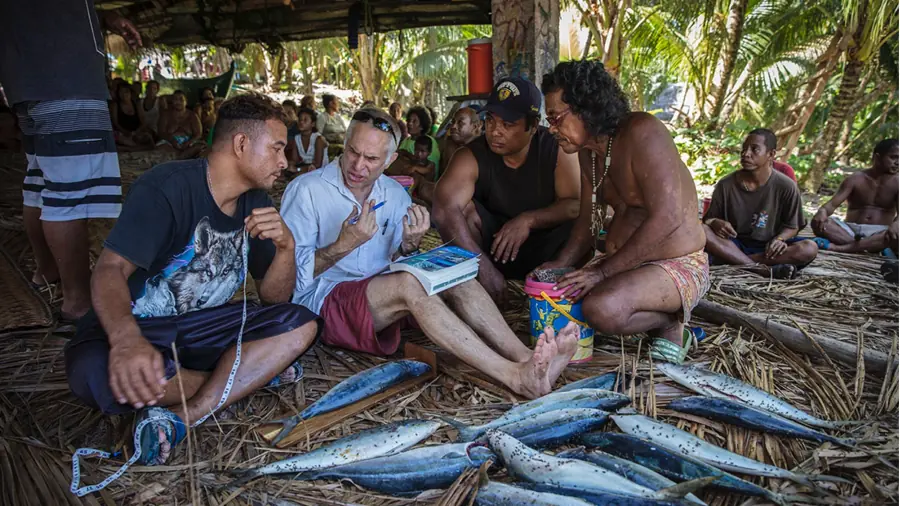 (Photo “Ulithi”)
(Photo “Ulithi”)
Paleo-Food Web Dynamics of Antarctic Krill Predators:
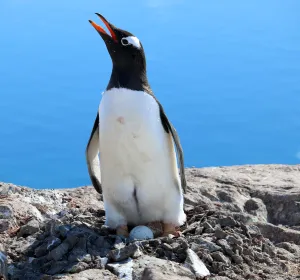 Gentoo penguin incubating an egg on the Antarctic Peninsula (Photo: Kelton McMahon)
Gentoo penguin incubating an egg on the Antarctic Peninsula (Photo: Kelton McMahon)
The Southern Ocean is a classic “canary in the coalmine” for the impacts of rapid climate change and anthropogenic disturbance on ecosystem function and resilience. This research provides an unprecedented look into how past climate change and historic whaling altered polar food webs through time, using penguins as bioindicators of ecosystem health. This research provides a window into predicted future food web responses in a rapidly warming World.
Regime shifts and the Biological Pump:
Deep-sea proteinaceous corals serve as “living sediment traps,” recording geochemical information about the organic matter sinking to depth from the sunlit surface ocean. In these projects, we are applying molecular geochemistry tools to deep-sea proteinaceous corals to reconstruct past changes in phytoplankton community dynamics and biogeochemical cycling on decadal to millennial time scales. This work provides insights into how changing food web architecture influences everything from ocean productivity to biogeochemical cycling and the efficacy of the biological pump.
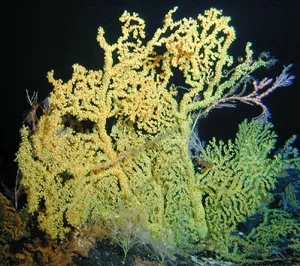 Hawaiian gold coral is a long-lived, deep-sea coral found in the North Pacific Ocean. (Photo credit: HURL)
Hawaiian gold coral is a long-lived, deep-sea coral found in the North Pacific Ocean. (Photo credit: HURL)
Coastal Ecosystem Food Web Dynamics:
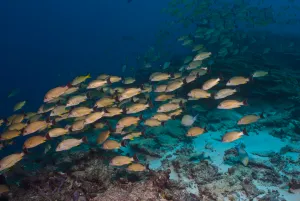 Large school of snapper on reefs of the Phoenix Islands Protected Area (Photo: Mark Priest)
Large school of snapper on reefs of the Phoenix Islands Protected Area (Photo: Mark Priest)
Coastal marine ecosystems are among the most productive and biodiverse ecosystems on Earth and provide critical goods and services to humans. These systems are also under tremendous pressure from direct and indirect human-environment interactions. Our research looks to address how food web architecture influences the structure, function, and resilience of coastal ecosystems by quantifying the sources and cycling of organic matter supporting coastal food webs.
Microplastics and coastal food webs:
Our goal is to advance our mechanistic understanding of the impact of microplastics, pollution, disease and ocean warming on commercially important shellfish species. We aim to improve our risk-assessment capabilities, by focussing on testing a novel hypothesis that microplastics will enhance the impact of pollutants and pathogens within marine food webs (e.g. Eastern Oyster, Crassostrea virginica). In turn, we are examining how predator-prey relationships with higher trophic level consumers are impacted under future ocean warming scenarios (e.g. Blue Crab, Callinectes sapidus), and quantify the potential for food web transfer of microplastics, pollutants and disease.
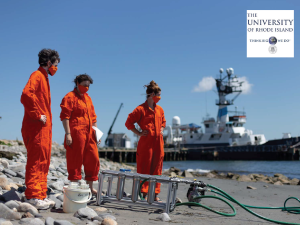 Photo: Coleen Suckling, URI
Photo: Coleen Suckling, URI
Compound-Specific Stable Isotope Methodology:
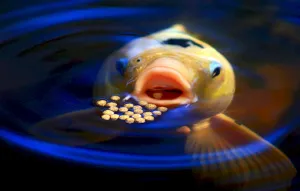 Photo (koi.pt)
Photo (koi.pt)
Through controlled laboratory experiments, our lab seeks to better understand the underlying biochemical and physiological mechanisms behind how organisms acquire, modify, and allocate dietary resources. The two primary foci of our controlled laboratory studies are to: 1) develop, expand, and refine amino acid carbon isotope fingerprinting to reconstruct the phylogenetic identity of primary producers fueling food web dynamics, and 2) quantify mechanisms of nitrogen isotope fractionation associated with trophic transfer. In doing so, this work advances the development of cutting-edge new CSIA tools while also improving our understanding of organismal nutritional ecology.
















































